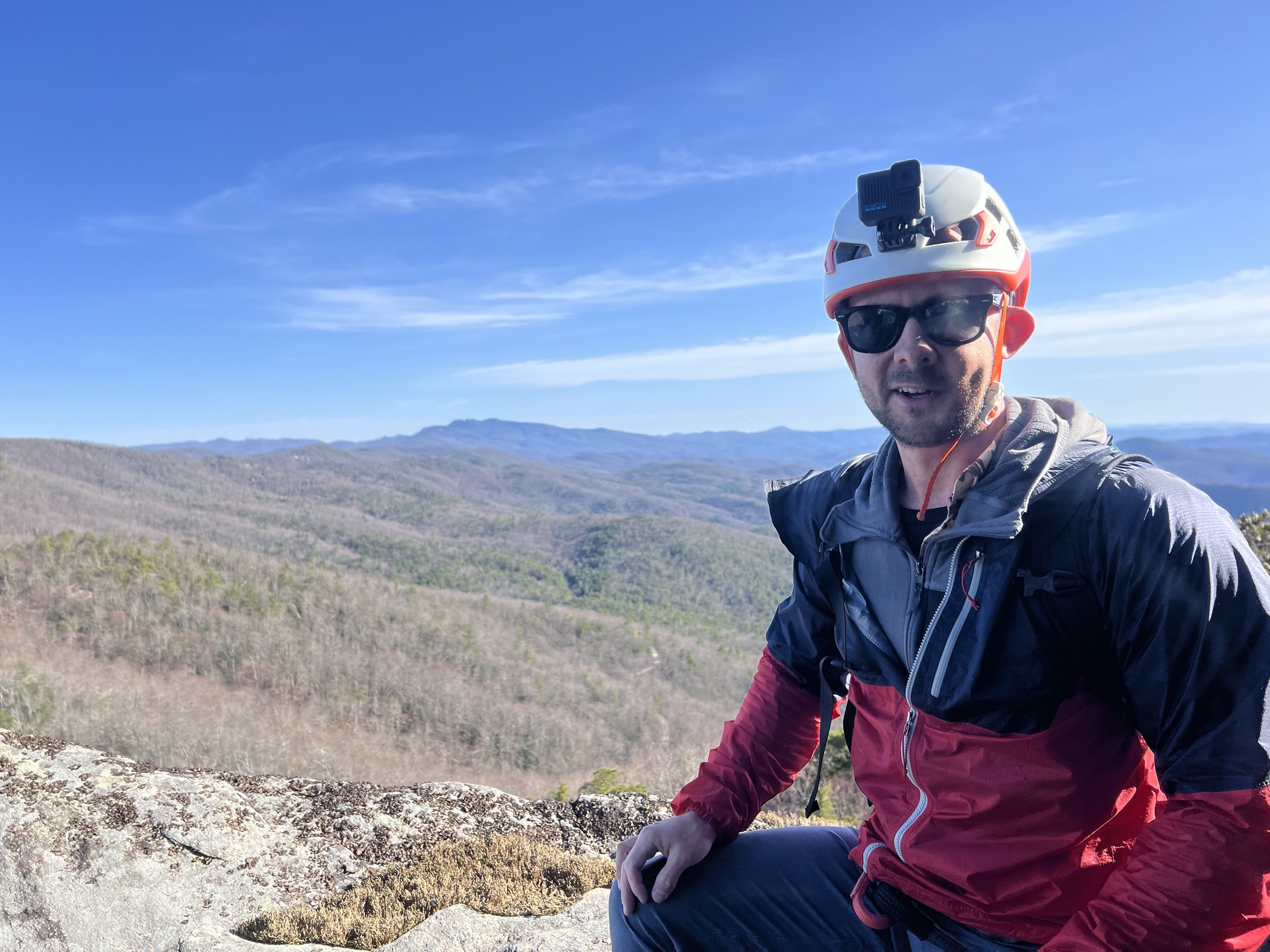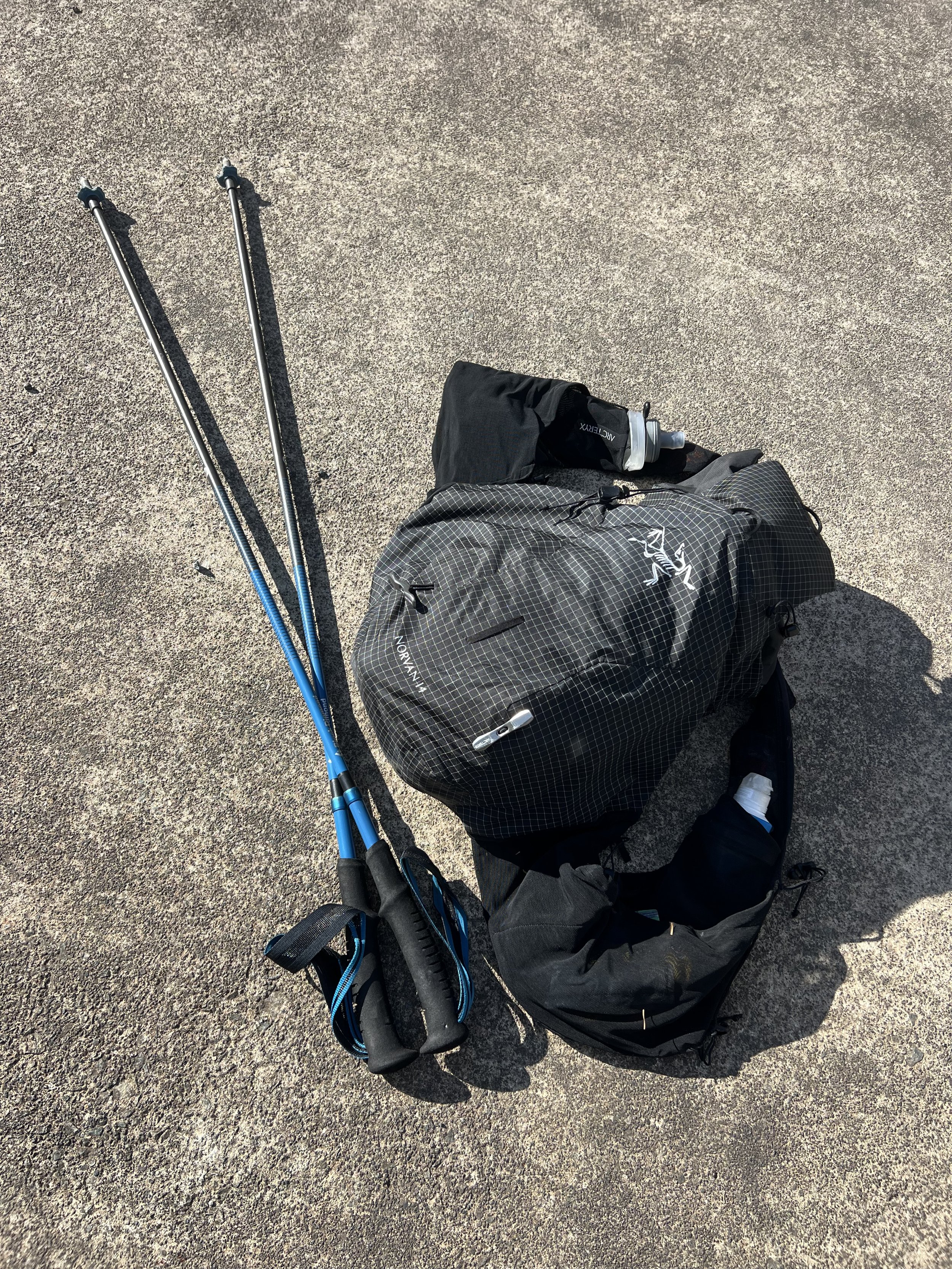The Linville Crusher, 5.10a V
A Link-Up of Grit, Quartzite, and Gorge-Wide Logistics
If you've ever wandered into North Carolina’s Linville Gorge with a rack in your pack and adventure on your mind, you may have heard whispers of the Linville Crusher — an ambitious climbing link-up that combines six distinct cliff zones, 16+ miles of rugged terrain, and 16 to 20 pitches of classic Linville quartzite. It’s not an official trail, but it’s very real — and completing it in a day requires smart logistics, efficient climbing, and deep knowledge of the terrain.
Seasonal Timing: Spring & Fall Are the best Windows
The Crusher isn’t for the peak of summer — or the dead of winter. You want:
Cooler temps to manage long approaches and keep from dying of heat exhaustion
Reliable water from seasonal seeps and springs
Clear trails (not overgrown or iced over)
Spring and fall offer that rare blend of dry rock, runnable trails, and manageable weather that can make or break the link-up.
Navigation Is Half the Game
We say this plainly: knowing the trails and terrain is crucial to completing the Crusher. The climbs are only part of the story — the movement between crags is where most teams get slowed down. Getting lost on NC Wall descent or slogging around Shortoff without beta can cost you hours. YouTube has several videos of teams attempting the Crusher and getting shut down after the first or second objective for the day.
Having a guide with detailed familiarity with every trail, gully, and shortcut helps stay on pace, troubleshoot, and move with confidence the entire day. Nobody can walk the miles for you, but local knowledge keeps you from walking extra miles.
Sitting Bear in the early morning light.
Route Breakdown: Our Chosen Link-Up
We stuck to a proud, direct version of the Crusher, linking classics across the Gorge:
Sitting Bear – The Original Route 5.9 1 pitch
Hawksbill – Star Trekkin 5.10a. 3 pitches
Table Rock – North Ridge 5.5. 3 pitches
Amphitheater – The Mummy 5.5. 3 pitches
NC Wall – The Prow (climbed up, not down) 5.4. 3 pitches
Shortoff – Little Corner 5.6. 4 pitches
What makes this link-up special is the incredible variety of climbing styles it includes. You get:
Free-standing spires like the summit block on Sitting Bear
Technical face climbing on Hawksbill
Cruiser moderates with massive exposure on Table Rock and the Prow
Historic lines put up by some of the legends of climbing in Western North Carolina.
It’s a sampler platter of Linville’s best, strung together in a single, unforgettable push.
Total Time: 11 Hours, 58 Minutes
From the first pitch to the final descent, the full loop took us just under 12 hours:
~16 miles of hiking and scrambling
~16–20 pitches of climbing
Countless transitions, rope-ups, and refuels
Efficiency came from knowing the route, preparing physically, and making smart decisions throughout the day regarding nutrition and route selection.
Keeping the rack light is essential for success. Being more knowledgeable on use of equipment allowed to go faster and lighter.
Gear & Logistics: Keep It Light, Keep It Smart
Rope
We used a 45-meter rope, which was lightweight and long enough to rappel key descents — especially the Mummy gully.
Rack
Minimalist but effective:
Single rack of cams
5–6 stoppers
A few trusty tricams
Pack & Movement
I used an Arc’teryx running pack, which let me:
Run with gear and a harness on
Carry all the essentials
Drink on the move
Stay balanced and efficient
Water Strategy
1 liter carried — but we also filtered water at:
A seep in the Amphitheater
A spring pipe in the Shortoff gully
This kept weight down and pace up. This might not be possible in the fall as the springs can be dry from the Summer if there hasn’t been a lot of rain.
Fitness & Mental Prep
Training for the Crusher is about more than climbing:
Trail endurance to hike quickly with a pack
Climbing fitness to move fast on long moderates
Mental control to stay sharp, focused, and calm under pressure or when you’re tired from a longgggg day
I was running 10-15 miles a week and lifting weights 2 days a week in addition to normal guiding work, and oh yea, climbing when I had the time.
Why Go Guided with Appalachian Climbing School
Even strong climbers can get turned around in the Gorge. If you're considering the Crusher and want to maximize your chances of success, booking a trip with Appalachian Climbing School provides:
Local knowledge of terrain, descents, and conditions
Help with gear selection, water strategy, and route beta
A partner who knows how to troubleshoot and adapt in the Linville Gorge
Whether you're looking to tick a personal goal or test yourself on a new level, a guided Crusher is the smart and safe way to go big.
The Linville Crusher isn’t about chasing grades or summits — it’s about flow, preparation, and presence. It forces you to respect the terrain, trust your training, and move with purpose. And when you finally top out on Shortoff, legs trashed and mind buzzing, you’ll know exactly why it’s called the Crusher.
Whether you’ve already tackled the Linville Crusher or it’s on your bucket list, grab one of our Appalachian Climbing School t-shirts or hoodies to show your support for the Gorge’s climbing culture. Our gear is soft, durable, and built for post-crusher recovery (or your next adventure).
If you want more Linville Crusher content including behind the scenes footage and prep videos from the perspective of one of our guests click here for more great content on YouTube.




